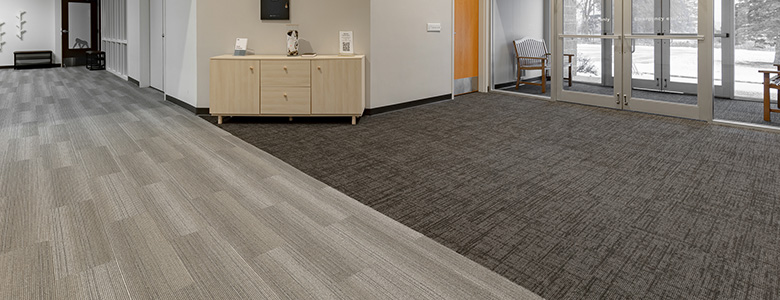Understanding the differences between commercial vs. residential flooring is crucial for selecting the right type of flooring for a space. Here are the key distinctions:
1. Durability and Performance
- Commercial Flooring:
- Designed to withstand high foot traffic, heavy loads, and wear and tear in offices, retail stores, hospitals, or other public spaces.
- Made with tougher materials like vinyl composite tiles (VCT), polished concrete, or commercial-grade carpet.
- Residential Flooring:
- Focuses more on comfort, aesthetics, and moderate durability for home use.
- Includes materials like hardwood, laminate, tile, and plush carpets, which are less suited for heavy wear.
2. Material Options
- Commercial:
- High-performance materials such as epoxy, rubber flooring, or luxury vinyl tiles (LVT) for functionality and longevity.
- Slip-resistance, water resistance, and easy maintenance are key priorities.
- Residential:
- A wider variety of textures, finishes, and styles, prioritizing visual appeal.
- Often includes natural materials like stone or engineered wood for a cozy aesthetic.
3. Cost
- Commercial:
- Generally more expensive due to the durability requirements and installation complexities.
- Long-term cost savings due to extended lifespan and lower maintenance costs.
- Residential:
- Typically more affordable upfront but may require replacement sooner in high-traffic areas.
4. Installation Requirements
- Commercial:
- Requires professional installation due to the complexity and adherence to safety standards.
- May involve moisture barriers, leveling, and specialized adhesives for durability.
- Residential:
- Can often be a DIY project or involve less intensive professional installation.
- Simpler processes like floating floor systems are common.
5. Aesthetic and Design
- Commercial:
- Prioritizes functionality over design, though modern commercial flooring options also incorporate stylish patterns and colors.
- Minimalist and practical aesthetics are common in offices or retail.
- Residential:
- Focused heavily on personal style and comfort, with a vast array of colors, patterns, and textures to suit homeowners’ tastes.
6. Maintenance and Cleaning
- Commercial:
- Designed for easy maintenance and frequent cleaning, often with materials resistant to stains and scratches.
- May require professional cleaning methods.
- Residential:
- Easier to clean but may be more prone to damage from spills, pets, or heavy furniture.
7. Safety Standards
- Commercial:
- Must comply with safety regulations, such as slip resistance, fire resistance, and accessibility standards.
- Includes considerations for people with disabilities or high-traffic conditions.
- Residential:
- Safety concerns are less stringent but may focus on non-slip surfaces for households with children or elderly residents.
By considering these differences, you can select the flooring that best suits the unique demands of the environment. You can always Get a Quote from us if you are looking for professional installation and specific advice if you want to choose between commercial vs residential flooring.



